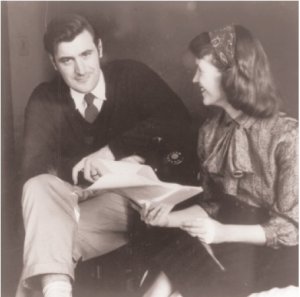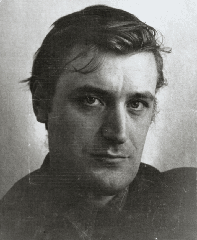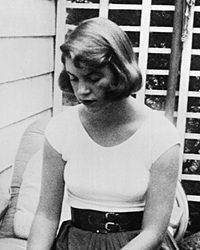
TED HUGHES VS SYLVIA PLATH


Ted
Hughes
A Woman Unconscious
Russia and America circle each other;
Threats nudge an act that were without doubt
A melting of the mould in the mother,
Stones melting about the root.
The quick of the earth burned out:
The toil of all our ages a loss
With leaf and insect. Yet flitting thought
(Not to be thought ridiculous)
Shies from the world-cancelling black
Of its playing shadow: it has learned
That there's no trusting (trusting to luck)
Dates when the world's due to be burned;
That the future's no calamitous change
But a malingering of now,
Histories, towns, faces that no
Malice or accident much derange.
And though bomb be matched against bomb,
Though all mankind wince out and nothing endure --
Earth gone in an instant flare --
Did a lesser death come
Onto the white hospital bed
Where one, numb beyond her last of sense,
Closed her eyes on the world's evidence
And into pillows sunk her head.
Lovesong
He loved her and she loved him.
His kisses sucked out her whole past and future or tried to
He had no other appetite
She bit him she gnawed him she sucked
She wanted him complete inside her
Safe and sure forever and ever
Their little cries fluttered into the curtains
Her eyes wanted nothing to get away
Her looks nailed down his hands his wrists his elbows
He gripped her hard so that life
Should not drag her from that moment
He wanted all future to cease
He wanted to topple with his arms round her
Off that moment's brink and into nothing
Or everlasting or whatever there was
Her embrace was an immense press
To print him into her bones
His smiles were the garrets of a fairy palace
Where the real world would never come
Her smiles were spider bites
So he would lie still till she felt hungry
His words were occupying armies
Her laughs were an assassin's attempts
His looks were bullets daggers of revenge
His glances were ghosts in the corner with horrible secrets
His whispers were whips and jackboots
Her kisses were lawyers steadily writing
His caresses were the last hooks of a castaway
Her love-tricks were the grinding of locks
And their deep cries crawled over the floors
Like an animal dragging a great trap
His promises were the surgeon's gag
Her promises took the top off his skull
She would get a brooch made of it
His vows pulled out all her sinews
He showed her how to make a love-knot
Her vows put his eyes in formalin
At the back of her secret drawer
Their screams stuck in the wall
Their heads fell apart into sleep like the two halves
Of a lopped melon, but love is hard to stop
In their entwined sleep they exchanged arms and legs
In their dreams their brains took each other hostage
In the morning they wore each other's face

Sylvia Plath
The Dead
Revolving in oval loops of solar speed,
Couched in cauls of clay as in holy robes,
Dead men render love and war no heed,
Lulled in the ample womb of the full-tilt globe.
No spiritual Caesars are these dead;
They want no proud paternal kingdom come;
And when at last they blunder into bed
World-wrecked, they seek only oblivion.
Rolled round with goodly loam and cradled deep,
These bone shanks will not wake immaculate
To trumpet-toppling dawn of doomstruck day :
They loll forever in colossal sleep;
Nor can God's stern, shocked angels cry them up
From their fond, final, infamous decay.
Love Letter
Not easy to state the change you made.
If I'm alive now, then I was dead,
Though, like a stone, unbothered by it,
Staying put according to habit.
You didn't just tow me an inch, no-
Nor leave me to set my small bald eye
Skyward again, without hope, of course,
Of apprehending blueness, or stars.
That wasn't it. I slept, say: a snake
Masked among black rocks as a black rock
In the white hiatus of winter-
Like my neighbors, taking no pleasure
In the million perfectly-chisled
Cheeks alighting each moment to melt
My cheeks of basalt. They turned to tears,
Angels weeping over dull natures,
But didn't convince me. Those tears froze.
Each dead head had a visor of ice.
And I slept on like a bent finger.
The first thing I was was sheer air
And the locked drops rising in dew
Limpid as spirits. Many stones lay
Dense and expressionless round about.
I didn't know what to make of it.
I shone, mice-scaled, and unfolded
To pour myself out like a fluid
Among bird feet and the stems of plants.
I wasn't fooled. I knew you at once.
Tree and stone glittered, without shadows.
My finger-length grew lucent as glass.
I started to bud like a March twig:
An arm and a leg, and arm, a leg.
From stone to cloud, so I ascended.
Now I resemble a sort of god
Floating through the air in my soul-shift
Pure as a pane of ice. It's a gift.
Poems source:
Ted Hugues poems: http://www.poemhunter.com/ted-hughes/poet-6616/
Sylvia Plath poems: http://www.poemhunter.com/sylvia-plath/poet-6642/
In this paper,
I am going to try to compare some poems by Ted Hughes and Silvia Plath
in order to analyse if there is any difference, not only in their style,
but also if there are differences in the way they write because of their
genre. Firstly, I would like to comment how hard it is to notice if there
are differences between poetry written by men or by women (the so-called
Genre-literature), by just witnessing a couple of writers or some poems,
so I will focus my analysis in these two poets, who are at the same time,
husband and wife; and I will try to find out the differences and resemblances
that are in some poems in order to appreciate if their perspectives over
the same topics are different because of their genre. All these poems
I have selected to analyse are very direct. I have chosen poems, whose topics
are love and death. Both poets focus their obsessions on these two topics,
showing the link that exists between them.
Both poets are
very interesting, especially due to their marriage and their life background.
Their seven years marriage was unusual and tragic. Hughes was very prolific
and famous, however Plath, despite she was also very famous, her circumstances
were not so handy. During 1962-1963, she had to live alone in a flat with
her two children. She was ill and these difficulties in her life seemed
to reinforce her need to write, despite she had no time (she often
worked between four and eight a.m., before the children awoke and she often
wrote poems in a few hours). On February 11, 1963, Sylvia Plath succeeded
in killing herself with cooking gas at the age of thirty. However, her husband
had a public life, many times travelling around the world and having differ-rent
affairs with other women. Many rumours said that this was the reason why
his wife committed suicide. So, Hughes wrote himself a sort of conversations
along poetical forms one year after their marriage and published on 1998,
and somehow he tries to explain the reasons why his wife committed suicide
and trying to explain that his adulterous relationship with Assia Wevill
had nothing to do with Plath´s suicide. (Biography
of Ted Hughes/ Poemhunter)
Concerning the “Death poems”, in the poem “A woman Unconscious”, Hughes uses a political issue to develop his impressions about death and the future. He starts the poem writing about the confrontation between Russia and America (L.1) and describing the situation the world lives because of their constant threats and struggles (L. 2-3) Then, the poet uses metaphors and images to explain the impression he has about this situation: He presents a world that is “melting from its womb”, an “earth that is burning out” and “ages that are coming to their end” (L 4-8) In my opinion, Hughes has an apocalyptical vision about the world and the future as if the world is going to burn out soon. He does not witness any possibility of escaping: cities, histories and people have nothing to do to stop the end of the world. (L. 14-15), because bombs will end falling over the earth and nobody will survive (L. 16-17). And, of course, the background of this vision is the two previous World Wars and the so-called cold-war, where the menace of the end of the world, the apocalyptical vision and the constant threat of a nuclear-bomb war was present everyday. The poet ends the poem with a beautiful image that represents perfectly the situation that mankind is living, in which a woman (maybe as a representation of fertility, the Mother, the possibility of pro-creation and all human race) waiting for the death that is coming in a white hospital bed, accepting the reality and surrendering (“into pillows sank her head”). On the other hand, the poem: “The Dead” by Silvia Plath, in my opinion, is very similar to the previous one, because both poets reflect the impossibility of escaping death. However, I think that “The Dead” reflects this topic from a different perspective.
Hughes writes about the anguish that people suffer in front of an inevitable death, and Plath writes about the fact of being already dead, fact that I think that reflects that she was more “prepared” for death than her husband. However, she does not describe the death as a paradise or with positive connotations; she describes it as something that nobody can escape: not even emperors or kings (L. 5-6). She also uses the metaphors of the “bed as a tomb” (L. 7) or “the death as a womb” (L.3) where the dead lie. Further-more, she presents the possibility of a doomstruck day when the dead will awake, but not as they were before because now they are not more than a bone shanks (L10-11). Then, they will lie forever in “a colossal sleep” where no God or angels could save them. So, the main topic of this poem is not only the death is inevitable, but also the acceptance that death is something horrible; and the death is not more than a final, infamous decay. So, as we can see, both poems are extremely negative and realistic.
Writing about love, both poets focus on the impact that loneliness causes when love is ended. Furthermore, also these two love poems are related with death, fact that I think reflects how thin the line is that separates both concepts. In the poem “Love Song”, by Hughes, the poet settles a scene in where two lovers are isolated from the rest of the world, enjoying and consuming their love. The verbs and expressions that the author uses are shocking and direct. I think that the author also uses these apocalyptical descriptions to explain the situation. The lovers “suck” and “devour” each other (L. 2, 4…); the poet focuses on the concept of “Carpe Diem”, in which time stops and lovers must enjoy their love before it is too late. They embrace each other, even “breaking their bones”, in order to make the union indestructible (L. 15-16). That is their paradise, where the real world never disturbs them (L.18-19). The poet goes on in the poem with some metaphors and personifications to emphasize that idea of their un-breakable union, despite the rest of the world’s events. Concepts like: “surgeon”, “brooch”, “assassin looks”… symbolize that union against time pace and the exterior world. However, after both lovers got consumed as a flame, the scene ends and, despite “their screams are stuck in the wall”, both must rest and sleep (last 3 stanzas), fact that in my opinion can be interpreted as a symbol of death, because after their “shaking” both must die exhausted and rest peacefully. On the other hand, the poem “Love Letter” by Plath represents another way of understanding love. The poem is written in first person, so it seems more autobiographical than the previous ones. Along this poem, Plath presents herself trying to overcome the pain that a relationship has produced over her. She introduces herself as a lady that was “dead”, but now she is “alive” and then she explains the reason. She was devastated before the relationship ended, impossible to move in conscious life. However, she uses her dreams as a metaphor of the death itself to explain how she has overcome that death. She uses many references to nature; and the impression that, before she was in a dark stoned crowd, but now she has rebelled, stopping the tears and coming out to light. (L. 10-18). And then, she falls asleep again, once she has rebelled, and with beautiful metaphors, the author remarks the symbol of her rebirth comparing herself to flowers and plants that bud again in March (After the white winter, follows the spring where plants blossom again). So, as in “The Dead”, she witnesses death as something that is just the beginning another new life.
In conclusion,
I think it is impossible to distinguish if a male or female has written
a poem just by reading it. Only if we knew some references about periods,
style… we could assume or point out that any poem is written by a male or
a female author. Furthermore, it is clear that Plath and Hughes´s
poetry have their own differences and particularities to guess which poem
is written by any of them. So, I do not believe that the so-called Genre-Literature
really exists; in my opinion, any author uses to write with total freedom
despite his/her genre.
BIBLIOGRAPHY:
Biographies, Biography of Ted Hughes,
PoemHunter.com,
Ed. PoemHunter Corp. , 10th May 2006.
<(http://www.poemhunter.com/ted-hughes/biography/poet-6616/)>